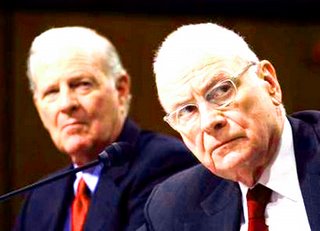 WASHINGTON, D.C. (AP)--For potential 2008 presidential candidates, the Iraq Study Group's report presents an opportunity to whip the president like a rug-soiling mutt over his criminal policies, even if they don't buy into or even understand all of the panel's recommendations.
WASHINGTON, D.C. (AP)--For potential 2008 presidential candidates, the Iraq Study Group's report presents an opportunity to whip the president like a rug-soiling mutt over his criminal policies, even if they don't buy into or even understand all of the panel's recommendations.As they promoted their findings Thursday at a congressional hearing, the group's members heard bipartisan praise for their effort, as anyone with half a brain could have predicted. But everyone running or considering running for president carefully avoided an all-out embrace of its more than six dozen recommendations, wisely leaving it to President Bush to fuck it up on his own.
The group--led by James A. Baker III, the trial lawyer who put Bush in office and protected the Saudi royal family from liability after 9-11, and former Representative Lee Hamilton, who helped keep the Bush Crime Family out of the Iran-Contra scandal--presented a downbeat assessment of the war, urged stepped up diplomacy and called for ways to pull back most U.S. combat troops by early 2008, when the next presidential election season will be heating up. No one at the hearings bothered to mention how painfully obvious all this should've been to anyone with even a rudimentary grasp of global politics.
Among White House hopefuls, the sharpest break with the report's recommendations came from Senator John McCain (R-AZ), who began criticizing Bush's war strategy the instant his approval numbers went south and has called for boosting U.S. troop strength in Iraq, three years too late. On Thursday, he once again positioned himself as a "maverick" by taking issue with the report's conclusion that the military was not equipped to handle a substantial and sustained increase in troops in Iraq, even though the Pentagon has been saying so for months.
"There's only one thing worse than an overstressed Army and Marine Corps, and that's a defeated Army and Marine Corps," McCain, a former Vietnam prisoner of war and current blithering idiot, told Baker and Hamilton during a Senate Armed Services Committee hearing. "We saw that in 1973. And I believe that this is a recipe that will lead to, sooner or later, our defeat in Iraq." He didn't say what might constitute victory in Iraq, but neither has the president.
The hearing featured another potential presidential front-runner, Senator Hillary Rodham Clinton, (D-NY) who summed up the Democratic strategy of emphasizing that the burden of altering policies and strategies in Iraq rests with Bush since he's, you know, the Commander-in-Chief.
"We've now heard from the Iraq Study Group, but we need the White House to become the Iraq results group," Clinton said during the hearing. "That is very frustrating for some of us. We don't understand the misjudgments and missteps that have been taken in the last years, including, sometimes, our own votes."
In an interview with The Associated Press, Senator Sam Brownback (R-KS), a gibbering wingnut who is also exploring a presidential bid, said Iraq needs to reach a point of "political equilibrium," even if that means partitioning the country along its ethnic groupings--a proposal that the Iraq Study Group did not endorse, since everyone else over the age of twelve knows that it wouldn't work. "You may end up having to have a Kurdish, a Sunni, a Shiite area, and Baghdad being a federal capital where they divide up the oil revenues fairly and democratically. Hopefully you can maintain it in one country," Brownback said, echoing the president's frequently-stated belief that hope is a policy.
Democratic Iowa Governor Tom Vilsack, who has announced his presidential campaign, said: "The good news is that the report is good, serious work with some sensible ideas. The bad news is that it is not a strategy. Only the president can make strategy, and he's an idiot."
Senator Chuck Hagel, a Nebraska Republican whose political career is thought to be a direct result of the number of electronic voting machines he owns, said the report "is an acknowledgment that there will be no military solution in Iraq." He called for the Bush administration "to forge a bipartisan consensus around a new way forward in Iraq," now that they have no choice.
Most Democrats heeded the advice of strategists who encouraged them to keep the war focus on Bush, where it belongs, and not turn the Iraq Study Group report into a blueprint of their own strategy for Iraq, since it can only hurt them.
Democrats rightly despise McCain and believe his call for more troops is intended to absolve him from blame if the United States remains mired in Iraq in 2008.
McCain this week said with a reasonably straight face that his stance was not motivated by politics.


No comments:
Post a Comment